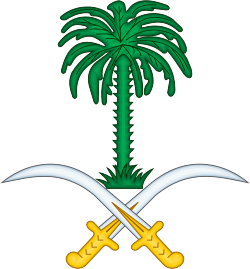Saudi Arabia–Turkey relations
Saudi Arabia and Turkey relationship have always fluctuated between cooperation, alliance to enmity and distrust. Since the 19th century, the two nations have always had a complicated relationship. While Turkey and Saudi Arabia are major economic partners,[1] the two have a tense political relationship, deemed from the historic enmity. Differences in the practice of Islam between the two countries often cause frictions.
 | |
Saudi Arabia |
Turkey |
|---|---|
Saudi Arabia has an embassy in Ankara and a consulate–general in Istanbul, and Turkey has an embassy in Riyadh and a consulate–general in Jeddah. Both countries are members of the World Trade Organization, G20 and the Organisation of Islamic Cooperation.
According to a 2013 Pew global opinion poll, 26% of Turks express a favourable view of Saudi Arabia while 53% express an unfavourable view.[2]
Historical background
Historically, the relationship between Turkey and Saudi Arabia have always fluctuated between cooperation and distrust to uncertainty and reapproachment. This is because of the historical enmity between the two nations dated from the Ottoman era.
In the 19th, the Ottomans entered into a serious conflict with House of Saud, the first Saudi state which resulted to the Ottoman–Wahhabi War. The war is seen in Saudi Arabia as the first attempt to create an independent state from the Ottoman Empire, while in Turkey, it is often considered to be the war against Wahhabist movement. This led to a brutal military reprisal by the Ottoman rulers, which saw the destruction of the First Saudi State and the executions of many religious leaders of the Saudis. For this reason, there is an eternal enmity between the Turks and the Saudis, which is reflected by recent revisionist campaigns in both countries.[3][4][5][6] The Ottoman Empire's collapse following the World War I would eventually lead to the Saudi resurgence and future establishment of modern Saudi Arabia.
The Hashimite rulers of the Hejaz pledged allegiance to the Ottoman Sultan in 1517 following the Ottoman conquest of Egypt, placing the holy cities of Mecca and Medina under Ottoman Protection until the Arab revolt in 1916 when Sharif Hussayn of Mecca expelled them with the aid of Britain. However, the Hashemites would be soon expelled by the Al-Saud, which would go on to rule Jordan and Iraq in early 20th century, thus it changed to the focus of Turkey's relationship to Jordan and Iraq.
Modern history
Relations between Turkey and Saudi Arabia began in 1932, after the creation of the new Kingdom of Saudi Arabia.
In October 2014, Saudi Arabia successfully campaigned against a Turkish bid for non-permanent membership of the United Nations Security Council, due to Saudi opposition to the Turkish stance on the Muslim Brotherhood.[7]
Due to the 2017 Qatar diplomatic crisis, the relationship between Turkey and Saudi Arabia faces problems, with Turkey supporting Qatar against Saudi Arabia in the ongoing diplomatic dispute.
World Pensions Council's M. Nicolas J. Firzli has argued that the Turkish government has sought to use the crisis to its own advantage, by advancing an expansionist Neo-Ottoman agenda at the expense of the Gulf Cooperation Council:[8]
Turkey and a resurgent Iran for their part are cynically using the festering crisis to advance a distinct agenda: rebuilding military and economic beachheads along the ‘eastern flank’ of the Arabian Peninsula from Oman to Southern Iraq, a part of the world from which they were forced out by the Royal Navy in 1917, precisely one hundred years ago. The local chess board is getting crowded with too many avid players, at a time when many British and American policy makers seem to have lost interest in that part of the world: this doesn’t bode well for the long-term stability of the MENA.
Saudi Arabia, in response, has threatened to impose sanctions against Turkey, and has conducted discussions with the UAE on the topic of curbing “Turkish expansionist policy”. In turn, Turkish President Recep Tayyip Erdoğan accused Saudi Arabia of being non-Islamic and heretics. Furthermore, Turkey has deployed troops to defend the government of Qatar from an attempted coup by Saudi Arabia and the UAE.[9]
On 1 March 2018, Saudi Arabia's MBC channels stopped broadcasting Turkish soap operas dubbed in Arabic to achieve the highest Arab interest.[10]
In March 2018, Saudi Crown Prince Mohammad bin Salman referred to Turkey as part of a "triangle of evil" alongside Iran and Muslim Brotherhood.[11][12]
In August 2018, Turkey backed Saudi Arabia in its dispute with Canada, rejecting the Canadian actions as a "form of interference in other countries’ internal affairs".[13]
On 2 October 2018, Saudi journalist and The Washington Post writer Jamal Khashoggi was killed in the Saudi Arabian consulate in Istanbul. It has been widely alleged that he was killed by the Saudi government, including by Erdogan, although he has refrained from criticizing Saudi Arabia directly and has instead suggested the blame lies with Crown Prince Mohammad bin Salman.[14][15]
After the incident, Prince Mohammad rejected the concept of a rift with Turkey, stating, "Many are trying to … drive a wedge between Saudi Arabia and Turkey. … They will not be able to do it as long as there is a King Salman, a Mohammad bin Salman and a President Erdogan."[16]
Almost a month after Khashoggi’s death, Erdogan directly accused the Saudi government of murdering the journalist. Erdogan said, "We know that the order to kill Khashoggi came from the highest levels of the Saudi government." He also said that "the puppet masters behind Khashoggi's killing" would be exposed.[17] Yasin Aktay, a top Turkish official and adviser to Erdogan believes Khashoggi’s body was dissolved in acid after being dismembered. He said, "The reason they dismembered Khashoggi's body was to dissolve his remains more easily. Now we see that they did not only dismember his body but also vaporised it.”[18]
The movie Kingdoms of Fire, aired by MBC in 2019, was partially financed by Saudi Arabia, further exacerbated by the portrayal of the Ottoman Turks as violent, ruthless and uncivilized people. This had drawn criticism in Turkey.[19][20]
The 2020 Baghdad International Airport airstrike, where Iranian general Qasem Soleimani was assassinated by the United States, had revealed the complicated nature of the relationship between Saudi Arabia and Turkey, with both countries approved, in secret, the airstrike with hope to remove a grave threat from Iran to both countries' ambitions in the Middle East.[21][22][23]
In February 2020, Saudi Foreign Minister Adel al-Jubeir accused Turkey of financing and sponsoring the "extremist militias" in Somalia, Libya and Syria,[24] Saudi Arabia also moved to block all Turkish websites in Saudi Arabia. In response, Ankara announced it would block all Saudi and Emirati websites in the country.[25]
Turkey and the Iranian–Saudi conflict
Turkey has played a very edgy role in the Iran–Saudi Arabia proxy conflict. Though being similarly Sunni like the Saudis, however experiences over the Salafist movement and the past pride of being a Sunni empire made Turkey extremely distrustful of Saudi Arabia, and has rejected Saudi attempts to fight in Yemen.[26] Turkey and Saudi Arabia, likewise, always fluctuates between antagonism and alliance. In the Syrian Civil War, Turkey and Saudi Arabia are on the Syrian opposition side against Iran-backed Bashar al-Assad, but Turkey sought to back the moderate forces, while Saudi Arabia enroached to Syria by supporting the radicals among the opposition, which made Turkey to become hostile.[27][28] Russian intervention forces Turkey and Saudi Arabia to have a level of compromise, but the distrustful of each others have hampered the process.
Outside Syria and Yemen, Turkey and Saudi Arabia have also been clashing over Libya for influence. Turkey has been throwing significant support to the Islamist-backed Government of National Accord in Tripoli, while Saudi Arabia, along with Egypt and the UAE, supported Khalifa Haftar's House of Representatives in Tobruk.[29][30] Turkish action has gained support from Iran however, thus deepens mistrust between Turkey and Saudi Arabia.[31]
Turkey and Saudi Arabia also clash for influence regarding other Muslim countries, notably Sudan. Sudan was once a former ally of Iran, but has cut off relations with Iran since 2015 to support Saudi Arabia's war efforts in Yemen. However, Sudanese fear of Saudi Arabian influence facilitated then-dictator Omar al-Bashir to get closer to Turkey, resulting in the lease of Suakin to Turkish contractors.[32][33] According from Turkish media, Saudi Arabia has been deeply skeptical over Turkish presence in Sudan, out of fear that Turkey is attempting to take Sudan away from Saudi influence and threaten Saudi Arabia's security.[34]
Turkish–Saudi relationship is also hampered by clash between Islamic school thought. Turkey has been traditionally refraining from funding Islamic schools, but since 2010s, Turkey has begun funding more and more Islamic schools with moderate Sunni thought against hardline Wahhabi teachings, resulting in the perceiving Turkish attempt to eradicate Saudi-funded madrasah arises in Saudi Arabia.[35] Though Turkish attempt is also looking to limit Iranian influence, Turkey also dislikes Saudi influence in similar manner.
Overall, Turkey in the proxy war between Iran and Saudi Arabia is often decided by who would Turkey prefer above.
Embassies
The Embassy of Saudi Arabia is located in Ankara, Turkey. The Embassy of Turkey is located in Riyadh, Saudi Arabia.
See also
References
- Saudi Arabia/Turkey: Turkish Trade Minister commends Saudi-Turkish relations International Islamic News Agency, 8 February 2010
- Saudi Arabia’s Image Falters among Middle East Neighbors Pew Research Global Attitudes Project
- https://english.alaraby.co.uk/english/comment/2020/6/24/saudi-arabias-erasure-of-its-ottoman-history-will-backfire
- https://www.arabobserver.com/turkish-propaganda-ignores-ottoman-violations-of-two-holy-mosques/
- https://english.alarabiya.net/en/in-translation/2020/07/30/As-Arabs-our-humanity-obliges-us-to-reject-the-Turks-early-servitude-of-the-Arabs
- https://www.middleeastmonitor.com/20190829-saudi-arabia-changes-ottoman-empire-to-occupation-in-school-textbooks/
- "TURKEY LOSES U.N. SECURITY COUNCIL SEAT IN HUGE UPSET". Newsweek. 16 October 2014.
- Firzli, M. Nicolas (17 June 2017). "The Qatar Crisis and the Eastern Flank of the Arab World". Retrieved 18 July 2017 – via Al Sharq Al Awsat www.academia.edu.
- Şafak, Yeni (3 August 2019). "Saudi, UAE coup attempt in Qatar foiled by Turkey". Yeni Şafak.
- "MBC stops all Turkish TV drama". www.aljazeera.com.
- "Iran dismisses Saudi talk of 'triangle of evil' as 'childish'". Al-Monitor. 8 March 2018.
- "Saudi prince says Turkey part of 'triangle of evil': Egyptian media". Reuters. 7 March 2018.
- "Turkish, Saudi foreign ministers discuss ties". Anadolu Agency. 10 August 2018.
- Weise, Zia (26 October 2018). "Erdoğan's risky Saudi strategy". POLITICO.
- editor, Patrick Wintour Diplomatic (23 October 2018). "Erdoğan's Khashoggi speech poses tough questions for Bin Salman" – via www.theguardian.com.CS1 maint: extra text: authors list (link)
- "MBS chats with Erdogan as Khashoggi leaks flow". Al-Monitor. 24 October 2018.
- "Khashoggi murder: Turkish leader blames Saudi state directly". BBC News. Retrieved 3 November 2018.
- "Khashoggi murder: Body 'dissolved in acid'". BBC News. Retrieved 2 November 2018.
- https://www.yenisafak.com/en/columns/yasinaktay/who-will-kingdoms-of-fire-fool-will-it-be-able-to-outshine-turkish-tv-series-2047248
- https://thearabweekly.com/tv-drama-challenges-historical-narrative-ottoman-conquest-arab-world
- https://www.al-monitor.com/pulse/originals/2020/01/turkey-iran-united-states-killing-soleimani-is-ankara-winner.html
- https://www.trtworld.com/opinion/saudi-arabia-and-the-soleimani-assassination-33076
- https://ahvalnews.com/turkey-usa/soleimanis-death-offers-erdogan-precious-opportunity-trump
- https://www.middleeastmonitor.com/20200214-saudi-arabia-accuses-turkey-of-supporting-extremist-militias-in-three-arab-countries/
- https://www.aljazeera.com/news/2020/04/turkey-blocks-saudi-emirati-state-news-websites-200419112800587.html
- https://english.alarabiya.net/en/views/news/middle-east/2015/03/29/How-to-read-Turkey-s-stance-on-the-Yemen-crisis
- https://carnegieendowment.org/2012/04/13/turkey-s-relations-with-syrian-opposition-pub-47841
- https://mepc.org/journal/saudi-arabias-motives-syrian-civil-war
- https://www.aljazeera.com/news/2019/04/saudis-gave-libya-haftar-millions-dollars-offensive-190412175708363.html
- https://www.aa.com.tr/en/energy/energy-diplomacy/turkey-reaffirms-support-for-libya-s-tripoli-government/25992
- https://www.middleeastmonitor.com/20200617-iran-fm-voices-support-for-turkey-backed-libya-government/
- https://www.dailysabah.com/diplomacy/2019/04/26/turkey-to-remain-on-sudans-suakin-island-for-civilian-purposes
- https://www.trtworld.com/turkey/why-is-sudan-s-suakin-island-important-for-turkey--13630
- https://www.dailysabah.com/columns/merve-sebnem-oruc/2019/05/10/who-is-disturbed-by-turkeys-presence-on-sudans-suakin-island
- https://www.files.ethz.ch/isn/176753/WORKING-PAPER-_Venetis-Ev.pdf

